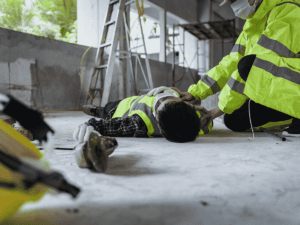What You Need to Know About Workers’ Compensation Construction Injuries [2022]
Construction work can be dangerous. Here is What You Need to Know About Workers Compensation Construction Injuries.
Workers are often exposed to a variety of risks, including falls, electrocution, and hazardous materials. When an injury occurs on a construction site, the workers may be able to file a workers' compensation claim and receive benefits. This type of insurance provides a standard set of benefits for the different types of injuries that arise out of and in the course of employment. In this blog post, we will outline some of the most common types of construction site injuries that are covered by workers' compensation benefits.
Common Types of Workers' Compensation Injuries Sustained While Working Construction
Some of the most common types of construction site injuries while working a construction job include:
- Falls from scaffolding or ladders resulting in orthopedic, internal, and head injuries.
- Electrocution from exposed wires or electrical shorts.
- Burns from using equipment or working with hot gas.
- Chemical exposures to the skin, eyes and through inhalation at the job site.
- Machinery accidents including excavators, bulldozers, motor graders, telehandlers, dump trucks, compactors.
- Crushing injuries from the mishandling of materials or machinery.
- puncture wounds from nails, screws or other protruding objects on the ground or around the construction area.
These are just some of the many different types of injuries that can occur on a construction site. Workers' compensation insurance will likely cover most of these types of specific injuries. If you have been injured in a construction accident, it is important to speak with an experienced workers' compensation attorney.
Third-Party Personal Injury Lawsuits Against Other Contractors
Workers' compensation benefits are provided to the injured worker regardless of fault. In other words, injured workers' receive the same benefits so long as the injury arose out of and in the course of the employment. These benefits are limited. Nevertheless, injured workers' might have additional legal rights to collect pain and suffering and other general damages in addition to workers' compensation.
In some cases, the injury may not be caused by the workers' employer, but by another contractor on the job site or one of their employees. When this happens, the injured worker may be able to file a third-party personal injury lawsuit against the negligent contractor. This is a separate insurance claim and lawsuit in addition to the workers' compensation claim with your employer.
General Contractors Are Usually Protected By The Right Insurance
The general contractor is the one who hires and oversees all the contractors on the job site. If the general contractor is negligent and has the right insurance, then he is protected by workers' compensation law and cannot be sued for negligence by any worker on the site.
Other Negligent Subcontractors Could Become Liable In Negligence
A subcontractor who was hired to do a specific job, such as electrical, plumbing or carpentry work, could cause injury to another subcontractor. This is the situation where the third-party lawsuit could come into play.
Third-Party Lawsuits Are Difficult
Third-party personal injury lawsuits can be complex because they require the injured person to prove that the other party acted with negligence. It is important to have an experienced personal injury attorney representing you. If you have been injured in a construction accident, contact us today for a free consultation. We will review your case and help you understand all of your legal options.
Premises Liability Lawsuit Against the Property Owner
In some cases, the injury may not be caused by the workers' employer or another contractor, but by the property owner. When this happens, the injured worker may be able to file a premises liability lawsuit against the property owner. This is a separate insurance claim and lawsuit in addition to the workers' compensation claim with your employer.
Premises liability claims require the injured person to prove that the premises owner acted negligent in some way. Premises liability claims can be difficult, and it's critical to have an personal injury attorney on your side. Contact us immediately if you've been injured in a construction accident and we'll help you get started on your case.
Products Liability Lawsuit Against the Manufacturer of Construction Equipment
If a worker is injured by a piece of defective construction equipment, the worker may be able to file a products liability lawsuit against the manufacturer of the equipment. This is a products liability case and it requires proving that the product had a defect that caused the incident that led to the injury. Although Workers' compensation provides basic benefits, it will not cover pain and suffering from injuries due to defective equipment, so a products liability lawsuit may be the only way for an injured worker to recover these damages.
Contact an Experienced Workers' Compensation & Third-Party Injury Lawyer
If you have been injured in a construction accident, it is important to seek medical attention right away. You should also speak with an experienced workers' compensation attorney to find out if you are eligible for benefits. Workers' compensation claims can be complex and challenging to navigate on your own. An experienced attorney will be able to help you understand your rights and options under the law.
What You Need to Know About Workers Compensation Construction Injuries is a general overview. It is not legal advice and this article does not form an attorney-client relationship. If you have been injured in a construction accident due to a negligent contractor who is not your employer, then it is important to speak with both a personal injury and workers' compensation lawyer.
Contact our office today for a free consultation with one of our experienced workers' compensation attorneys & personal injury lawyers.
- A Guide on Red Light Auto Accidents in California - August 14, 2024
- Self-Representing in a California Personal Injury Claim - August 13, 2024
- Common Sources of Distraction for Drivers in California - August 13, 2024



